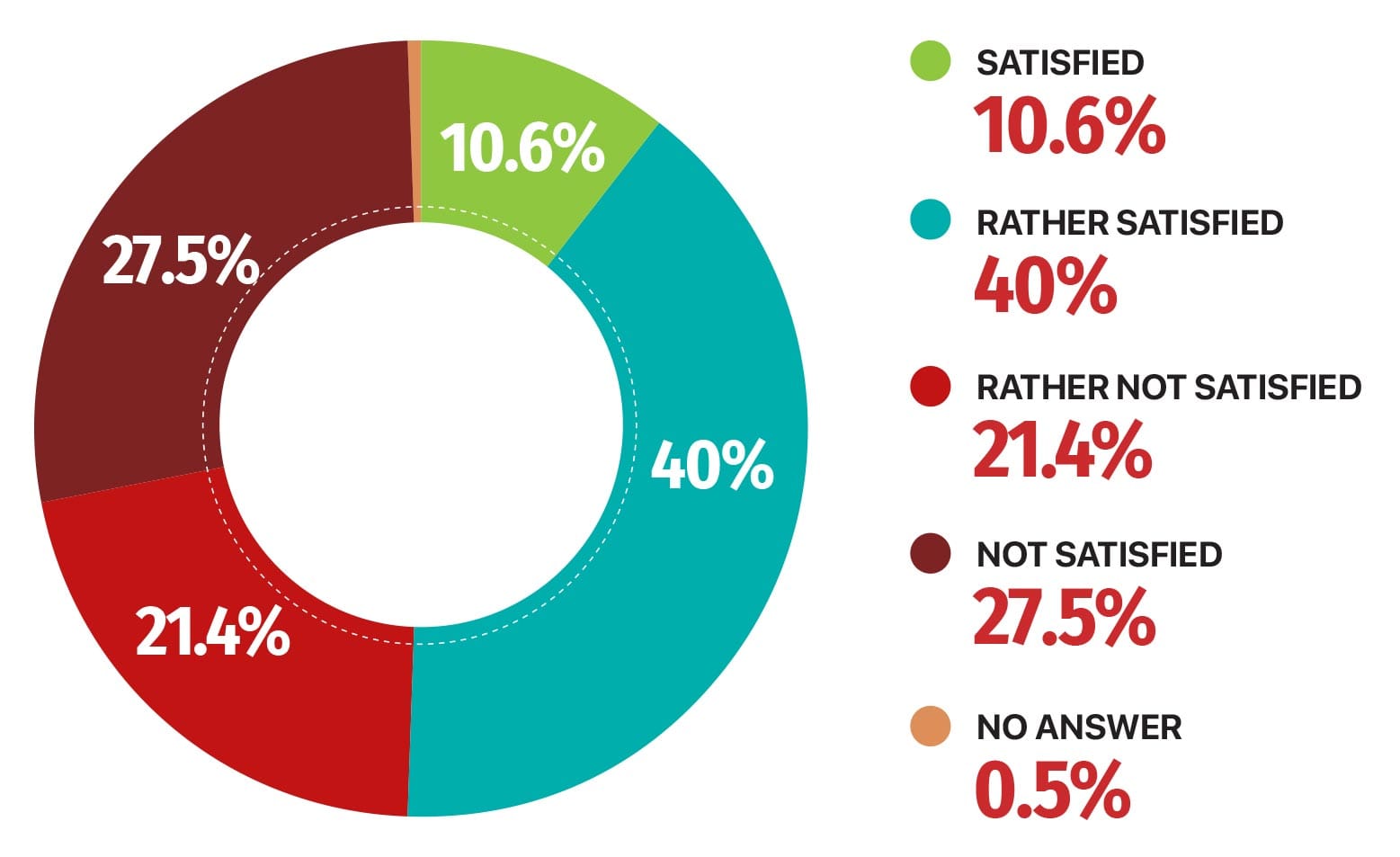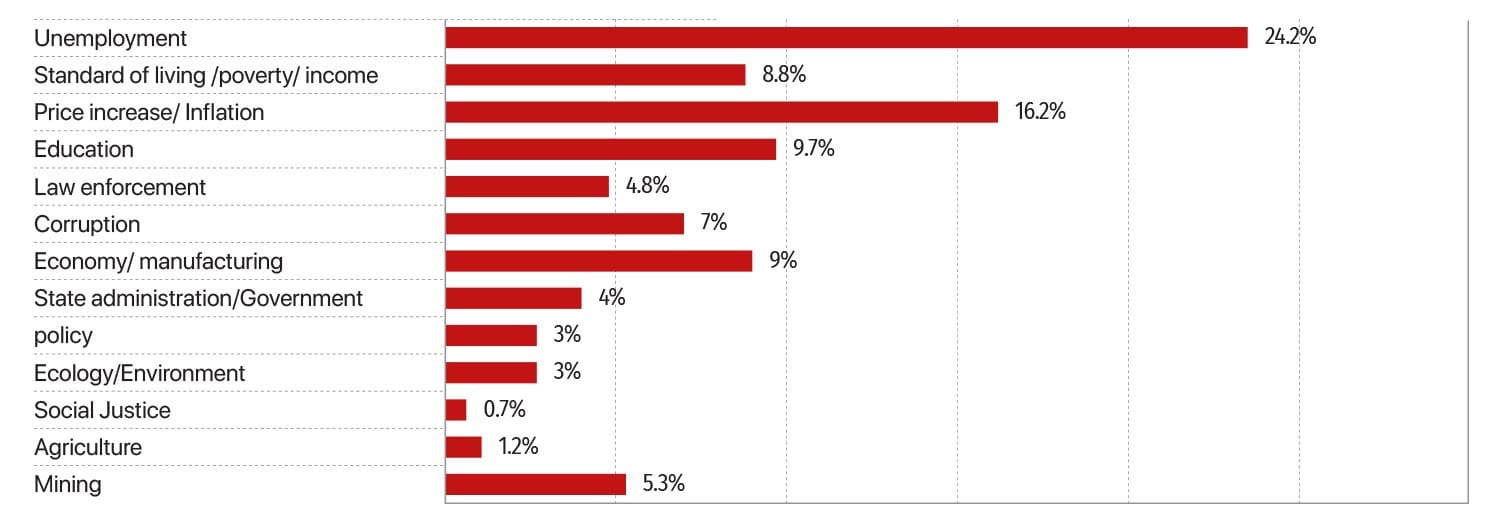Corruption risks
Mongolia continues to perform poorly on corruption index. In the 2024 Transparency International Corruption Perceptions Index, it scored 33 out of 100, ranking 114th out of 180 countries, where 100 indicates very clean and 0 represents highly corrupt.
Mongolia’s Corruption Perception Index
Source: Transparency International
Factors contributing to corruption include conflicts of interest, lack of transparency, limited access to information, an underfunded civil service system, low salaries, and weak government oversight of key institutions, as noted in the U.S. Embassy in Mongolia’s 2024 Investment Climate Statements: Mongolia.
Independent Authority Against Corruption – the government agency – is an independent state organization responsible for raising public awareness, preventing corruption, investigating corruption cases, and verifying the asset and income declarations of public officers.
With recent strong public awareness and opposition to corruption cases, the Government of Mongolia has been taking decisive actions to combat corruption.
Mongolia has recovered $13.9 million in assets from abroad since 2020, implementing measures based on local anti-corruption laws and the United Nations Convention Against Corruption to address corruption at the international level and recover assets obtained through corruption. These recovered assets have been registered as state revenue.
In 2020, Mongolia implemented e-governance services known as “E-Mongolia”, which enhanced public services, maximized efficiency, and aimed to eliminate front-desk and mid-level corruption. By 2024, E-Mongolia provides 1263 different services from state related 87 organizations.
One of the most well-known high-profile corruption cases was “Coal thieves” which the government has been focused on since 2022.
The “coal thieves’ case” refers to a 2022 scandal in Mongolia involving the illegal smuggling of coal across the Chinese border. High-ranking politicians and business leaders were implicated, leading to public protests. The scandal is estimated to have caused losses of up to $11 billion to Mongolia’s economy, highlighting corruption and management failures in the country’s coal sector. In connection with the coal scandal, a total of 13 politically influential individuals and 90 public officials have been investigated as suspects. During the investigation, a total of 14.9 billion MNT has been recovered as state revenue.
In 2024, the Mongolian parliament approved the “National Anti-Corruption Program – Action Plan for Implementation in 2023-2030.”
The National Anti-Corruption program is a medium-term initiative to be implemented from 2023 to 2030, aiming to establish the foundational conditions for the execution of Mongolia’s long-term development policy, “Vision-2050.” It seeks to reduce corruption by strengthening the national justice system and legal framework, and to prevent corruption and conflicts of interest through coordination with the “New Recovery Policy.”
Political Stability Risk
Mongolia’s political environment is peaceful and stable and power is transferred peacefully by democratic elections. The country has a relative social advantage, given the low crime rate and low social unrest. In the nine Parliamentary Elections held peacefully since the 1992 Constitution came into effect, power has alternated between the two major parties, the Mongolian People’s Party and the Democratic Party.
The 2024 parliamentary election, following a 2023 constitutional amendment that increased the number of seats in Parliament from 76 to 126, saw four parties and one coalition secure seats. The Mongolian People’s Party won 35% of the vote, securing 68 seats. The Democratic Party gained 42 seats, marking its largest increase since the 1996 elections.
The average tenure of a government in Mongolia stands at just 1.8 years.
The most recent protest against the Mongolian government took place in May 2025, lasting for three weeks in Ulaanbaatar. The demonstrations erupted after social media posts showed the son and fiancée of then-Prime Minister Oyun-Erdene Luvsannamsrain displaying luxury gifts and lavish lifestyles, sparking widespread public anger. Thousands of mostly young protesters took to the streets demanding transparency, anti-corruption reforms, and his resignation. The unrest ultimately led to Oyun-Erdene’s resignation following a failed confidence vote in parliament.
Earlier, in 2022, amid the Covid-19 pandemic, another major protest broke out following revelations of corruption in Mongolia’s coal exports to China. The scandal, known as the “Coal Theft” or “Coal Mafia” case, ignited nationwide outrage as citizens accused public officials of illegally profiting from coal sales, while also voicing anger over rising prices, economic hardship, and deepening corruption.
The Sant Maral Foundation, a reputable and politically impartial polling organization in Mongolia, conducted a survey of 1,000 respondents in the 2024 spring, right before the parliamentary elections. The results showed a significant lack of trust in the current political system among the respondents.
How satisfied are you with democracy and present political system?
Rating of socio-political or economic problems in Mongolia today
Source: Sant Maral Foundation, 2024



